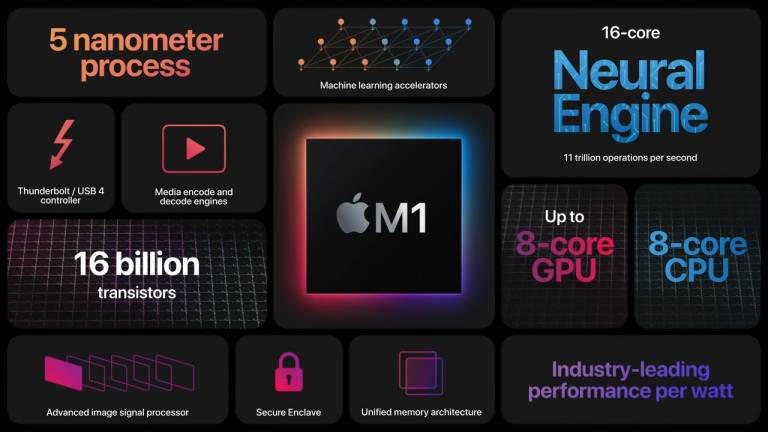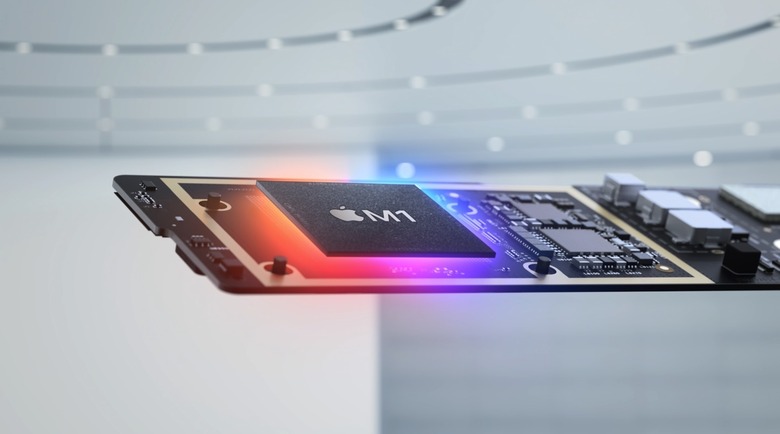Apple's Massive MacBook M1 Chip Upgrade Might Come Next Year
The M1 System-on-Chip (SoC) that already powers four MacBooks and two iPad Pro sent shivers down Intel's spine earlier this year. Apple announced last summer that it would transition all of its laptops to its silicon. It started the switch in November. A few months later, Intel was already blasting the M1 MacBooks in online ads. Apple's laptops received praising reviews, with users highlighting the M1's performance and the MacBooks' battery life. It wasn't a surprise that Intel's ads backfired and found plenty of criticism. Apple then made more unexpected M1 moves in early 2021 when it unveiled the M1-powered iMac and 2021 iPad Pro. And Apple is expected to debut the M1X chip later this year. But a new report teases an even bigger SoC upgrade for next year's iPads and MacBooks.
According to Nikkei's sources, Apple and Intel will be the first companies to adopt TSMC's latest chip technology. That's 3nm processors that will come out next year. They would qualify as a major MacBook M1 chip upgrade.
iPad and Macs now share Apple processors
The report says that Apple and Intel are both testing the 3nm technology. The processors will hit the market in the second half of 2022. TSMC says the 3nm chips can increase performance by 10% to 15% and reduce power consumption by 25% to 30% compared to 5nm chips like the A14 Bionic in the iPhone 12 series and 2020 iPad Air or M1 in the MacBook and iPad Pro.
The report also notes that the 2022 iPhones, which we're calling iPhone 14 series, for the time being, will make use of TSMC's 4nm tech. The 3nm tech will be used in chips that will power the iPad next year, Nikkei says, without mentioning the Mac.
Apple stunned the world when it placed the M1 chip inside the 2021 iPad Pro this year. The company gave the tablet the same formidable performance as the M1 Macs. This signaled an important shift in Apple's iPad strategy. The M1 is no longer just Intel's biggest problem. It also threatens Android tablet makers that have no M1 rival handy.
This is also an indication that Apple wants its best possible SoC inside its best iPad. A speedier, more efficient 3nm chip qualifies as the best possible SoC for an iPad, so the tablet that Nikkei refers to must be next year's iPad Pro refresh. That's just speculation at this point, but it's based on what Apple did so far.

Apple's M1 chip that powers MacBooks, Macs, and iPads.
MacBook M1 chip successor
The 3nm processor will probably be the successor of the MacBook's M1 chip. Some leaks already mention Apple's M2 for this year's Mac refreshes. But the 2021 MacBook Pro and Air models will get an M1X processor. It's still a 5nm chip, but it'll offer performance improvements over last year's model.
This 3nm M1 chip successor will likely power many Mac and MacBook versions launching next year. By 2022, all of Apple's MacBooks and Mac desktops will run on Apple SoCs.
What's interesting in the report is that Intel wants access to the same 3nm process. Intel delayed the rollout of both its 10nm and 7nm chips. That's why Apple's 5nm M1 chip is so scary right now. Other ARM chipmakers might follow Apple's lead and release their own 5nm SoCs for Windows computers well before Intel rolls out its own 7nm processors.
"Currently, the chip volume planned for Intel is more than that for Apple's iPad using the 3-nanometer process," one of Nikkei's sources said.
This is another indication that whatever 3nm SoC Apple is making with TSMC, it must be of the high-end variety that will power iPads, MacBooks, and Mac desktops. These tablets and computers will compete against Windows 11 devices launching in the second half of 2022 with 3nm processors on board.
